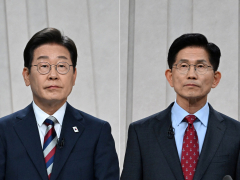Voters in South Korea are choosing a new president to replace Yoon Suk-yeol who was impeached and removed from office over his brief and ill-fated martial law bid in December.
The snap election on June 3 is pivotal, with implications for South Korea’s democratic future, as well as its ties with China, the United States and its nuclear armed neighbour, North Korea.
The winner – who will serve a single term of five-years – faces the task of addressing the fallout from the martial law decree, which lasted six hours but unleashed political chaos, including mass protests, a riot at a court and three caretaker leaders in six months.
The new president will also have to tackle a deepening economic downturn and manage tariff negotiations with the US, which has imposed a 25 percent levy on key exports such as steel, aluminium and automobiles.
Here’s what you need to know about the June 3 poll:
Who are the candidates?
There are six candidates on the ballot, but the main contenders are Lee Jae-myung of the opposition Democratic Party of Korea (DP), and Kim Moon-soo of the governing conservative People Power Party (PPP).
Who is expected to win?
Lee, 61, a human rights lawyer-turned-politician, is the clear frontrunner.
A Gallup Korea poll on May 28 showed 49 percent of respondents favoured the liberal candidate, while 36 percent said they would vote for Kim, 73, a staunch conservative who served as labour minister in Yoon’s government.
Trailing in third place is Lee Jun-seok of the conservative New Reform Party, at 9 percent.
What are the key issues?
Yoon’s botched martial law bid has cast a shadow over the race.
It put Lee, who lost the last election to Yoon in 2022, back on track for the presidency.
The leader of the opposition was instrumental in foiling the president’s plan. On December 3, when Yoon declared martial law – in a bid to quash the Democratic Party-dominated parliament, which he portrayed as “anti-state” and a “den of criminals” – Lee rushed to the National Assembly and climbed the walls of the building to avoid the hundreds of armed troops deployed there. He livestreamed his exploit, urging supporters to come to the parliament and prevent the arrest of legislators.
Despite the troop blockades, enough legislators managed to make it to the parliament and vote to end martial law. The assembly went on to impeach Yoon on December 14.
“This election would not have happened if not for the declaration of martial law by Yoon Suk-yeol and his impeachment,” said Youngshik Bong, research fellow at Yonsei University in Seoul. “These issues have sucked in all others like a vortex. Everything else is marginal.”
On the campaign trail, Lee has pledged to bring to justice anyone involved in Yoon’s failed bid and has also promised to introduce tighter controls on the president’s ability to declare martial law.

Where the candidates stand on the martial law attempt
Lee, the opposition leader, has also proposed constitutional changes to introduce a four-year, two-term presidency – at the moment, South Korean presidents are only allowed a single term of five years. Lee has also argued for a run-off system for presidential elections, whereby if no candidate secures 50 percent of the popular vote, the top two candidates take on each other in a second round.
“A four-year, two-term presidency would allow for a midterm evaluation of the administration, reinforcing responsibility,” he wrote on Facebook, calling for a constitutional amendment to enable the change. “Meanwhile, adopting a run-off election system would enhance the legitimacy of democratic governance and help reduce unnecessary social conflict.”
The PPP’s Kim has accepted Lee’s proposals for a constitutional amendment to allow a two-term presidency, but has suggested shortening each term to three years.

Yoon’s martial law bid, however, has left the PPP in crisis and disarray.
Infighting plagued the embattled party as it tried to choose the impeached president’s successor. Although Kim won the party primary, its leaders tried to replace him with former Prime Minister Han Duck-soo. On the eve of the party’s campaign launch, they cancelled Kim’s candidacy, only to reinstate him after party members opposed the move.
Bong, at Yonsei University, said the infighting as well as divisions in the conservative camp over Yoon’s decree has cost it support.
“Kim Moon-soo has not set his position clearly on the martial law declaration,” Bong said. “He has not distanced h




